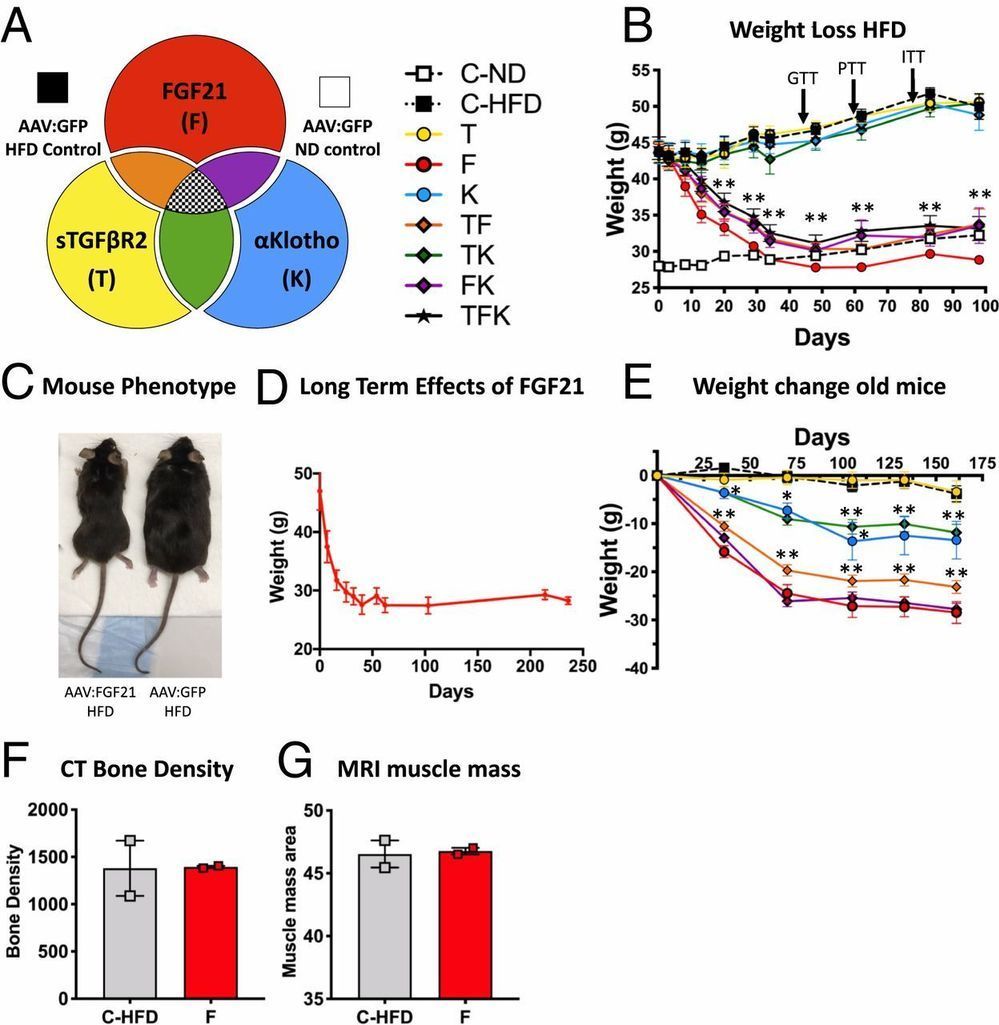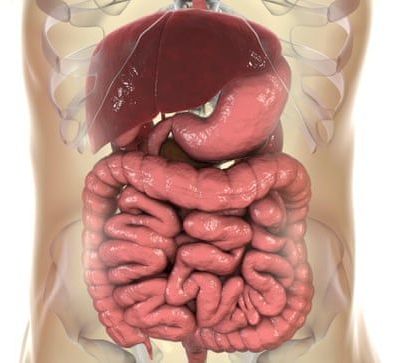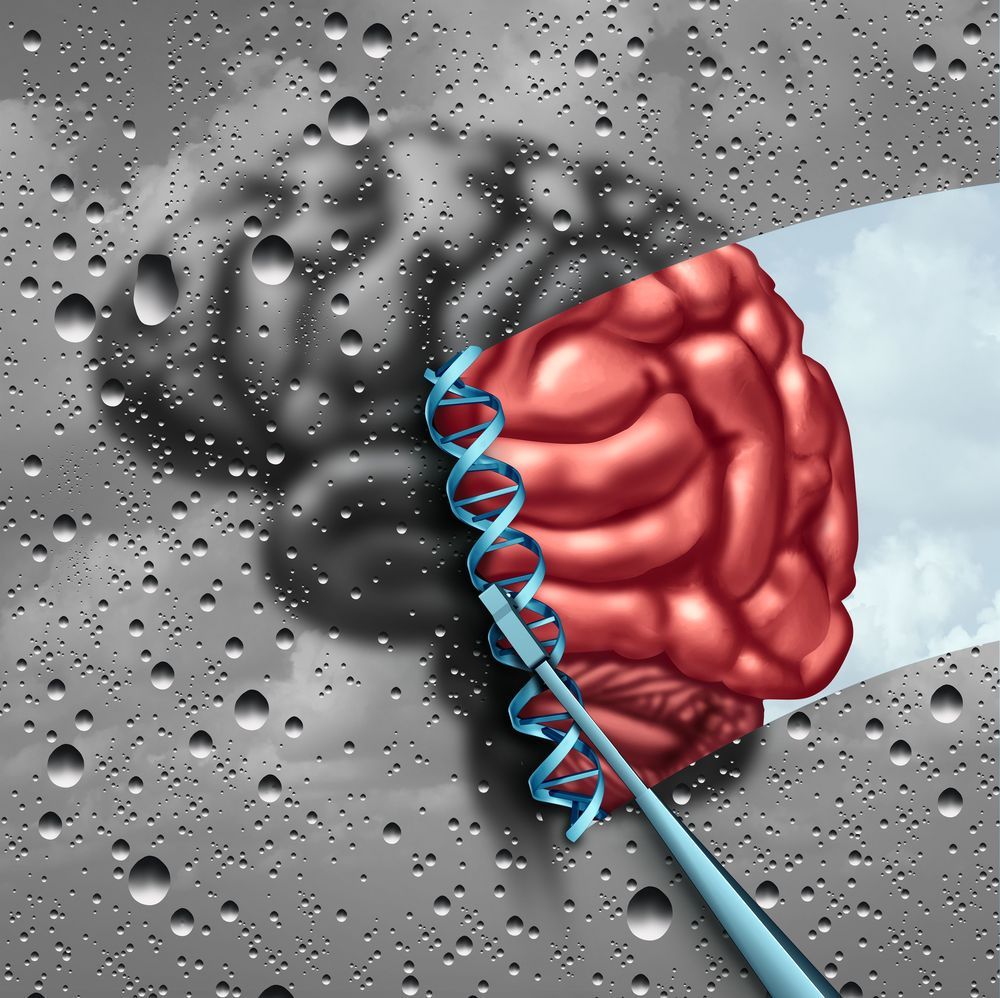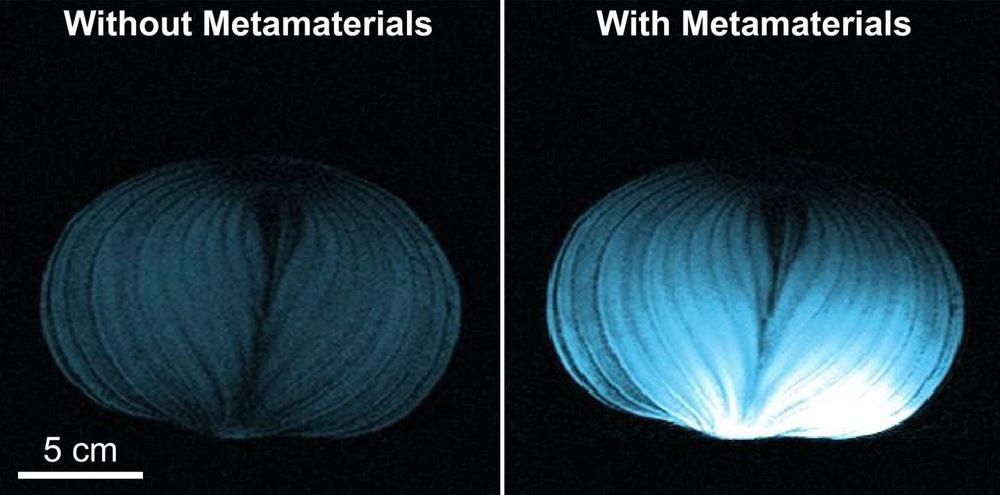Today we’re going to talk to the godfather of longevity, Aubrey de Grey, in the most ironic of settings – a pub in London. Over a beer, Aubrey explains why he believes that many of the typical health practices, such as drinking a lot of water, are myths and what he has discovered about slowing down the aging process. He reckons that in as little as 17 years, aging will no longer be a concern, and he supports this radical standpoint with some fascinating research. He talks about the idea that health is an integral part of longevity and that the seven pillars of aging need to be addressed simultaneously.
Category: biotech/medical – Page 2,248

A single combination gene therapy treats multiple age-related diseases
Human and animal longevity is directly bound to their health span. While previous studies have provided evidence supporting this connection, therapeutic implementation of this knowledge has been limited. Traditionally, diseases are researched and treated individually, which ignores the interconnectedness of age-related conditions, necessitates multiple treatments with unrelated substances, and increases the accumulative risk of side effects. In this study, we address and overcome this deadlock by creating adeno-associated virus (AAV)-based antiaging gene therapies for simultaneous treatment of several age-related diseases. We demonstrate the modular and extensible nature of combination gene therapy by testing therapeutic AAV cocktails that confront multiple diseases in a single treatment. We observed that 1 treatment comprising 2 AAV gene therapies was efficacious against all 4 diseases.
Comorbidity is common as age increases, and currently prescribed treatments often ignore the interconnectedness of the involved age-related diseases. The presence of any one such disease usually increases the risk of having others, and new approaches will be more effective at increasing an individual’s health span by taking this systems-level view into account. In this study, we developed gene therapies based on 3 longevity associated genes (fibroblast growth factor 21 [FGF21], αKlotho, soluble form of mouse transforming growth factor-β receptor 2 [sTGFβR2]) delivered using adeno-associated viruses and explored their ability to mitigate 4 age-related diseases: obesity, type II diabetes, heart failure, and renal failure.

Some gut bacteria may increase bowel cancer risk, research suggests
Study shows people with more Bacteroidales bacteria may have up to 15% more risk of disease.

At Gala Held
The televised gala, broadcast on the National Geographic Channel as well as YouTube and China’s Tencent, whose founder Ma Huateng is also a sponsor, played heavily on a theme that’s become somewhat tarnished in Silicon Valley in recent years—that scientific and technological progress will solve humanity’s biggest problems. For the past two years, Facebook and Google have both been battered by lawmakers and the public for how they’ve failed to eliminate the spread of fake news, conspiracy theories (sometimes about science) and content that connects violent extremists. Both Zuckerberg and Pichai have also countered rising complaints from the tech giants’ workforces.
Some of the top scientists who accepted Breakthrough Prize awards used the nationally broadcast ceremony to decry the spread of misinformation, problems that continue to dog the tech giants whose leaders, including Facebook CEO Mark Zuckerberg and Google CEO Sundar Pichai, celebrated at the glitzy Silicon Valley gala Sunday evening.
“Science is a rock of truth in a sea of fake news,” said physicist Peter van Nieuwenhuizen, who with collaborators Sergio Ferrara and Daniel Freedman accepted an award Sunday evening for their work around the theory of supergravity.
David Julius, a University of California at San Francisco physiology professor who won a $3 million award for research into the capsaicin found in chili peppers and pain relief, noted “we live in a time when technology and so many other resources make so much possible. ”


Specific phase of sleep to best calm an anxious brain identified
A fascinating new study from scientists at UC Berkeley has homed in on exactly which phase of sleep seems to best keep anxiety levels in check. The research both affirms a causal association between sleep and anxiety, and suggests sleep deprivation lowers activity in the prefrontal cortex, an area of the brain that helps regulate our emotions.
For well over a century scientists have observed a correlation between sleep disruption and mood disorders such as anxiety and depression. Only in the last few years have clear neural mechanisms been discovered helping us understand exactly what our brains are doing when we are asleep, and how physiologically disruptive sleep deprivation can be.
A new study from UC Berkeley has focused more specifically on how sleep can modulate a person’s anxiety levels. Using a number of experimental measures, including polysomnography and functional MRI, the research first found that just one night of sleep deprivation resulted in 50 percent of the study subjects reporting anxiety levels the next day equal to those detected in subjects with clinically diagnosed anxiety disorders.

Microbiome-altering Alzheimer’s drug unexpectedly approved in China
In a surprise to many researchers around the world, Chinese authorities recently approved a novel drug claimed to improve cognitive function in patients with Alzheimer’s disease. The drug, derived from a marine algae, is the first new Alzheimer’s drug to reach the market anywhere in the world in almost 20 years, and is suggested to reduce neuroinflammation by modulating a person’s gut microbiome.
GV-971, or sodium oligomannate, is derived from a common form of seaweed called brown algae. For several years the compound has been under investigation in China as a treatment to slow, or even reverse, cognitive decline associated with mild to moderate cases of Alzheimer’s disease.
The latest announcement from China’s National Medical Products Administration (NMPA) has granted the drug “conditional approval”, meaning it is to be fast-tracked to market based on positive early Phase 3 trial results. The “conditional approval” requires ongoing studies to verify efficacy and safety, however, it can now move to open market sales in China within the next month or two.

Researchers design ‘intelligent’ metamaterial to make MRIs affordable and accessible
Boston University researchers have developed a new, “intelligent” metamaterial—which costs less than ten bucks to build—that could revolutionize magnetic resonance imaging (MRI), making the entire MRI process faster, safer, and more accessible to patients around the world. The technology, which builds on previous metamaterial work by the team, was described in a new paper in Advanced Materials.
MRI is used by clinicians to diagnose medical problems by spotting abnormalities that could indicate anything from a torn meniscus to muscular dystrophy. But MRIs are expensive, expose patients to radiation, and they take a long time—often the greater part of an hour for a single scan. Finding enough MRI time for waiting patients can be a problem, even in US hospitals, but in hospitals in countries like India, waiting periods of a year or more can put patients’ lives at risk.
So how do we speed up the MRI process without jeopardizing the quality of imaging? Xin Zhang, a BU College of Engineering professor of mechanical engineering and a Photonics Center professor, and a team of researchers that includes Stephan Anderson, a Boston Medical Center radiologist and BU School of Medicine professor of radiology, and Xiaoguang Zhao, a MED assistant research professor of radiology, are getting creative with metamaterials to solve the problem.

All children to receive whole genome sequencing at birth, under ambitions laid out
All children will be able to receive whole genome sequencing at birth, under ambitions laid out by the Health Secretary.
Matt Hancock said that in future, the tests would be routinely offered, alongside standard checks on newborns, in order to map out the risk of genetic diseases, and offer “predictive, personalised” care.
Ministers have already promised that such tests will be offered to all children diagnosed with cancer by the end of this year.
Human Aging REVERSED In New Medical Breakthrough
Human aging has been reversed in a new medical breakthrough. John Iadarola, Brooke Thomas, and Greg Fahy break it down on The Damage Report. Follow The Damage Report on Facebook: https://www.facebook.com/TheDamageReportTYT/
Help build the Home of the Progressives http://tyt.com/JOIN
Follow The Damage Report on Twitter: https://twitter.com/TheDamageReport
“A small clinical trial, which was conducted by a team of researchers led by Dr. Greg Fahy, has shown for the first time in humans that reversing biological age may be possible.
The results of TRIIM are in.